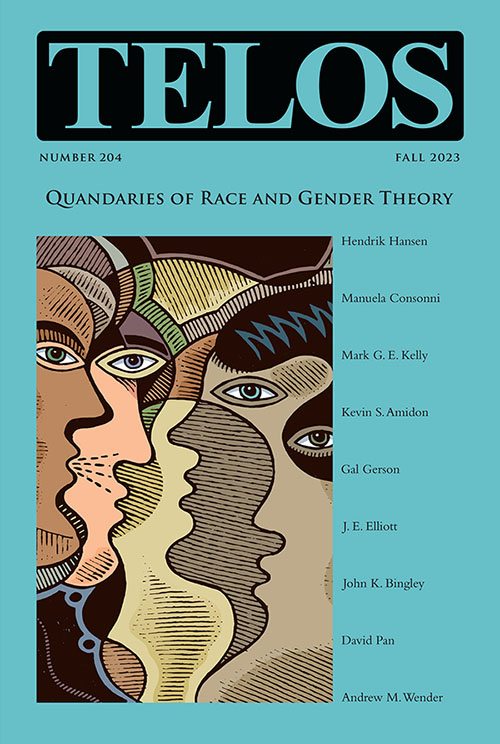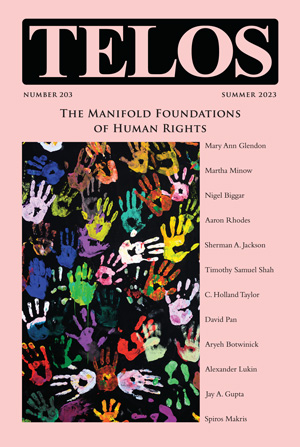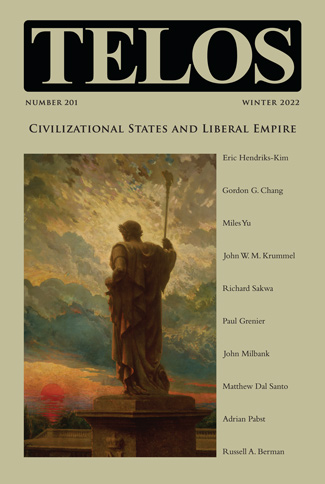By David Pan · Wednesday, October 18, 2023 Telos 204 (Fall 2023): Quandaries of Race and Gender Theory is now available for purchase in our store. Individual subscriptions to Telos are also available in both print and online formats.
 Old-style leftists have puzzled over how today’s left-liberals have abandoned traditional left-wing goals such as reducing class inequality and improving working-class standards of living. A key reason lies with the shifting of the politics of class. As Paul Piccone and Fred Siegel argued over thirty years ago in these pages, the problem of class is no longer a question of capitalists against workers. According to a recent Gallup poll, 61 percent of U.S. adults own stock, and such capitalist ownership, while a good way to increase wealth, is no longer the preserve of the ruling class and does not by itself confer much power. Rather, the ruling class that exercises real power consists not of owners but primarily of a bureaucratic class of managers in corporations, government, non-profits, universities, and the media. In spite of this shift, theories developed over a century ago continue to shape current leftist perspectives. Dominated by a socialist perspective, left-wing social policy fails to recognize and address the new contours of class division. As a result, it continues to employ a framework that is based on an anti-capitalist and anti-market agenda that tries to manipulate outcomes to promote socialist goals, precisely the methods of a managerial class. Old-style leftists have puzzled over how today’s left-liberals have abandoned traditional left-wing goals such as reducing class inequality and improving working-class standards of living. A key reason lies with the shifting of the politics of class. As Paul Piccone and Fred Siegel argued over thirty years ago in these pages, the problem of class is no longer a question of capitalists against workers. According to a recent Gallup poll, 61 percent of U.S. adults own stock, and such capitalist ownership, while a good way to increase wealth, is no longer the preserve of the ruling class and does not by itself confer much power. Rather, the ruling class that exercises real power consists not of owners but primarily of a bureaucratic class of managers in corporations, government, non-profits, universities, and the media. In spite of this shift, theories developed over a century ago continue to shape current leftist perspectives. Dominated by a socialist perspective, left-wing social policy fails to recognize and address the new contours of class division. As a result, it continues to employ a framework that is based on an anti-capitalist and anti-market agenda that tries to manipulate outcomes to promote socialist goals, precisely the methods of a managerial class.
Continue reading →
By David Pan · Friday, October 13, 2023  Hamas’s horrifying attack on Israeli civilians is a continuation of terrorist methods that it has been using for years against Israel. As a technique of war, its terrorism functions primarily as a way of gaining support from current and potential allies. Such a massacre can only serve Hamas’s war aims to the extent that the use of terror as a technique of war points to an ideological similarity with its allies, Iran and Hezbollah. Hamas’s use of terror only makes sense because the allies it is trying to convince—anti-Semitic populations and terrorists in the Arab world as well as totalitarians everywhere—share their disregard for principles of human rights as well as their use of fear and hatred as the primary determiners of political life. Terrorism only works for Hamas insofar as it can appeal to similar inclinations in others in order to build a broader alliance of terrorist movements and totalitarian states. Hamas’s horrifying attack on Israeli civilians is a continuation of terrorist methods that it has been using for years against Israel. As a technique of war, its terrorism functions primarily as a way of gaining support from current and potential allies. Such a massacre can only serve Hamas’s war aims to the extent that the use of terror as a technique of war points to an ideological similarity with its allies, Iran and Hezbollah. Hamas’s use of terror only makes sense because the allies it is trying to convince—anti-Semitic populations and terrorists in the Arab world as well as totalitarians everywhere—share their disregard for principles of human rights as well as their use of fear and hatred as the primary determiners of political life. Terrorism only works for Hamas insofar as it can appeal to similar inclinations in others in order to build a broader alliance of terrorist movements and totalitarian states.
This terrorist approach to politics defines the asymmetry in the conflict between Hamas and Israel. In contrast to Hamas, Israel and its main ally, the United States, are committed to protecting human rights, even in the face of terrorist enemies. Without such self-control, Israel could destroy Hamas by conducting the same kind of indiscriminate killing of Palestinians that Hamas has used against Israel. There is no doubt that if Hamas had the means at its disposal, it would not hesitate to kill the entire population of Israel. But in eschewing such terrorist methods, Israel ends up being attacked for its failures to live up to the human rights principles that it espouses. In its commentary on the conflict, Human Rights Watch focuses primarily on the Israeli siege of Gaza as a war crime while treating Hamas’s massacres of Israelis merely as the work of “individuals” who “should be brought to justice.”[1] Perversely, Israel loses legitimacy due to its general support for human rights, even as it struggles to balance a respect for human rights with its need to fight for its existence against the terrorists and totalitarians that surround it. Meanwhile, Hamas is not considered to be the political leadership of Gaza but as a set of bad individuals to be differentiated from the Gazan population. Clearly, Hamas’s use of Palestinians as human shields indicates how its terrorism translates into totalitarian rule within Gaza. Yet to treat the Palestinians as victims and Hamas as a few bad individuals ignores the political reality that Hamas constitutes the elected political authority of Gaza and recruits its fighters from the Gazan population that supports it.
Continue reading →
By David Pan · Wednesday, July 26, 2023 Telos 203 (Summer 2023): The Manifold Foundations of Human Rights is now available for purchase in our store. Individual subscriptions to Telos are also available in both print and online formats.
 One of the most disappointing human rights debacles in the last few years was the withdrawal of U.S. forces from Afghanistan. For those who still take an interest, the human rights situation there has become horrendous, with Human Rights Watch documenting the denial of schooling and employment to women, extrajudicial killings, and torture. Moreover, in a severe rebuttal to those who supported the withdrawal, Taliban rule has created the conditions for a renewal of terrorist groups that can now develop and train in Afghanistan with impunity. There is also a good case to be made that the U.S. withdrawal there emboldened Putin to invade Ukraine, calculating that the United States and its allies no longer have the stomach for protracted conflicts in order to prevent human rights abuses. It may be that we have traded a low-grade conflict in Afghanistan for a high-intensity one in Ukraine. The lesson here is that the struggle for human rights, while beginning as a moral problem about our common responsibilities, can only be taken seriously when we consider its political ramifications. What do we owe to our fellow humans, and what sacrifices should we make in order to fulfill those responsibilities? One of the most disappointing human rights debacles in the last few years was the withdrawal of U.S. forces from Afghanistan. For those who still take an interest, the human rights situation there has become horrendous, with Human Rights Watch documenting the denial of schooling and employment to women, extrajudicial killings, and torture. Moreover, in a severe rebuttal to those who supported the withdrawal, Taliban rule has created the conditions for a renewal of terrorist groups that can now develop and train in Afghanistan with impunity. There is also a good case to be made that the U.S. withdrawal there emboldened Putin to invade Ukraine, calculating that the United States and its allies no longer have the stomach for protracted conflicts in order to prevent human rights abuses. It may be that we have traded a low-grade conflict in Afghanistan for a high-intensity one in Ukraine. The lesson here is that the struggle for human rights, while beginning as a moral problem about our common responsibilities, can only be taken seriously when we consider its political ramifications. What do we owe to our fellow humans, and what sacrifices should we make in order to fulfill those responsibilities?
Continue reading →
By David Pan · Wednesday, July 5, 2023 In spite of the divided opinions concerning the Supreme Court’s ruling against affirmative action in college admissions, there is still solace in realizing that there is an underlying consensus that racial discrimination has no place in U.S. society. The primary dispute is about the means of achieving a society without racism.
The majority opinion of the Court is that discriminating by race not only is unjust but reinforces the discrimination that it is meant to eliminate. Rather than overturning precedent, as the dissenters claim, the Court reaffirms the idea of the injustice of discrimination established in a series of Supreme Court judgments. Judge Roberts cites one such case that affirms: “‘Distinctions between citizens solely because of their ancestry are by their very nature odious to a free people whose institutions are founded upon the doctrine of equality.’ Rice v. Cayetano, 528 U. S. 495, 517 (2000) (quoting Hirabayashi v. United States, 320 U. S. 81, 100 (1943)). That principle cannot be overridden except in the most extraordinary case.” Evaluating people by their race is clearly contrary to the idea of equal treatment established in such previous cases, and the majority opinion uses this long-held principle as the guide for its judgment.
Continue reading →
By David Pan · Friday, February 24, 2023  On the anniversary of the Russian invasion of Ukraine, the continuing war indicates that the foundations of a rules-based global order are not just the rules themselves but also the structure of sovereignty that supports those rules. Sovereignty includes both the use of power and the establishment of a legitimating vision of order. The challenges to the Westphalian system of global order consequently come not just from the Russian invasion but also from the Russian idea of its civilizational mission against Western secularism as well as China’s idea of a “shared humanity for mankind.” Telos 201 provides analyses of both of these alternative visions for global order. Matthew Dal Santo, for example, describes Russia’s stance as a defense of a spiritual rather than a secular conception of the basis of order. Gordon Chang analyzes the way in which China has been promoting its tianxia model of unified global governance against the chaos and conflict of separate sovereign nation-states. The frame within which to view these alternative visions is not the struggle between spirituality and secularism or between China and the West, but the global development of nationalism. On the anniversary of the Russian invasion of Ukraine, the continuing war indicates that the foundations of a rules-based global order are not just the rules themselves but also the structure of sovereignty that supports those rules. Sovereignty includes both the use of power and the establishment of a legitimating vision of order. The challenges to the Westphalian system of global order consequently come not just from the Russian invasion but also from the Russian idea of its civilizational mission against Western secularism as well as China’s idea of a “shared humanity for mankind.” Telos 201 provides analyses of both of these alternative visions for global order. Matthew Dal Santo, for example, describes Russia’s stance as a defense of a spiritual rather than a secular conception of the basis of order. Gordon Chang analyzes the way in which China has been promoting its tianxia model of unified global governance against the chaos and conflict of separate sovereign nation-states. The frame within which to view these alternative visions is not the struggle between spirituality and secularism or between China and the West, but the global development of nationalism.
Continue reading →
By David Pan · Monday, January 16, 2023 Telos 201 (Winter 2022): Civilizational States and Liberal Empire is now available for purchase in our store. Individual subscriptions to Telos are also available in both print and online formats.
 In concluding that “All political action has then in itself a directedness towards knowledge of the good: of the good life, or of the good society,” Leo Strauss describes an essential link between power and values. Because the power to make decisions about our future cannot be separated from the fundamental goals and ultimate meaning of our lives, we cannot exercise power that would be divorced from some set of values. Even the narrowest understanding of self-interest must come to terms with one’s own mortality and the meaning of others for our own existence. Consequently, raw power does not exist, as it can only be exercised within some understanding of its purposes. In concluding that “All political action has then in itself a directedness towards knowledge of the good: of the good life, or of the good society,” Leo Strauss describes an essential link between power and values. Because the power to make decisions about our future cannot be separated from the fundamental goals and ultimate meaning of our lives, we cannot exercise power that would be divorced from some set of values. Even the narrowest understanding of self-interest must come to terms with one’s own mortality and the meaning of others for our own existence. Consequently, raw power does not exist, as it can only be exercised within some understanding of its purposes.
When we consider the way in which power functions on a global level, it will also be crucial to understand how a world order will reflect a particular way of structuring the relationship between values and power. Even the seemingly most egregious use of power can only take place within the framework of an attempt to realize values in the world, and realist accounts of global order must also recognize the importance of some ideology such as nationalism as a means of establishing political values. Accordingly, discussions of balance-of-power dynamics can only begin once great powers emerge as a consequence of the political will of certain peoples to understand themselves in a certain way. Based on such measures as GDP, population, and military spending, Russia does not rank particularly well in relation to countries such as Brazil and India, neither of which pretends to great power status. If Russia can be considered a great power today, it is primarily because of the goals and values that its government embodies. Values form the foundations of global order, and Russia only continues to project its power because it maintains a sense of the global reach of its values for determining order for others.
Continue reading →
|
|
 Old-style leftists have puzzled over how today’s left-liberals have abandoned traditional left-wing goals such as reducing class inequality and improving working-class standards of living. A key reason lies with the shifting of the politics of class. As Paul Piccone and Fred Siegel argued over thirty years ago in these pages, the problem of class is no longer a question of capitalists against workers. According to a recent Gallup poll, 61 percent of U.S. adults own stock, and such capitalist ownership, while a good way to increase wealth, is no longer the preserve of the ruling class and does not by itself confer much power. Rather, the ruling class that exercises real power consists not of owners but primarily of a bureaucratic class of managers in corporations, government, non-profits, universities, and the media. In spite of this shift, theories developed over a century ago continue to shape current leftist perspectives. Dominated by a socialist perspective, left-wing social policy fails to recognize and address the new contours of class division. As a result, it continues to employ a framework that is based on an anti-capitalist and anti-market agenda that tries to manipulate outcomes to promote socialist goals, precisely the methods of a managerial class.
Old-style leftists have puzzled over how today’s left-liberals have abandoned traditional left-wing goals such as reducing class inequality and improving working-class standards of living. A key reason lies with the shifting of the politics of class. As Paul Piccone and Fred Siegel argued over thirty years ago in these pages, the problem of class is no longer a question of capitalists against workers. According to a recent Gallup poll, 61 percent of U.S. adults own stock, and such capitalist ownership, while a good way to increase wealth, is no longer the preserve of the ruling class and does not by itself confer much power. Rather, the ruling class that exercises real power consists not of owners but primarily of a bureaucratic class of managers in corporations, government, non-profits, universities, and the media. In spite of this shift, theories developed over a century ago continue to shape current leftist perspectives. Dominated by a socialist perspective, left-wing social policy fails to recognize and address the new contours of class division. As a result, it continues to employ a framework that is based on an anti-capitalist and anti-market agenda that tries to manipulate outcomes to promote socialist goals, precisely the methods of a managerial class. 









